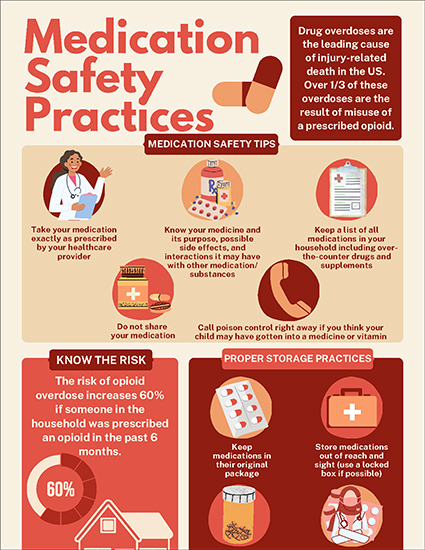Alcohol and Substance Use Prevention
Harm Reduction Resources
Dallas County Health and Human Services - 2377 N. Stemmons Freeway, Dallas, TX 75207
Telephone: 214-819-2000
Harm reduction is a strategy designed to reduce the harm associated with using drugs through resources and education. It involves using public health strategies like preventing harm, reducing risks, and promoting health. The goal is to help people who use drugs and their families make healthier choices and live more fulfilling lives.
Narcan (Naloxone) is an over-the-counter medication used to reverse an opioid overdose. Administering Narcan to a non-opioid overdose victim will not harm them. An addition dose of Narcan can be administered every 3 minutes if an overdose victim continues to not respond. Narcan is the brand name for Naloxone.
- Remove the nasal spray from the packaging and lay the person on their back
- Hold the nasal spray with your thumb on the bottom of the plunger and your middle fingers on either side of the nozzle
- Tilt the person’s head back and insert the nozzle into one nostril until your fingers are against their nose
- Press the plunger firmly to give the dose and then remove from the person’s nose
- If the person does not respond in 2-3 minutes, give a second dose from a new nasal spray (if available)
Instructional Videos
- If you or someone you know is at risk for opioid overdose, it is important to have Narcan available. This provides an extra layer of protection and can save a life.
- If you work in a setting that serves high-risk individuals, it is important to have Narcan available. These groups may include: nurses, employees at homeless shelters, employees at transitional houses, law enforcement officers, jail personnel, bar/hotel employees, etc.
- 3 out of 5 people who died by overdosing were alone at the time of drug use. Having another person present allows for quick intervention and reduces the risk of overdose.
Good Samaritan Law / Overdose Bystander Law
HB 1694 (also known as The Jessica Sosa Act) establishes a defense to prosecution in certain cases for people who call 911 for a possible overdose. This defense is not available for people who have previous convictions under certain drug laws, people who have already used the defense in the past and people who have called 911 for a possible overdose in the last 18 months. It becomes effective September 1, 2021, and it applies to any event on or after this date. This law does not provide full immunity from liability. So, to create clarity, we are referring to it as the Overdose Bystander Law.
Knowing where to find free Naloxone can be challenging. Here is a list of community partners and locations around Dallas County that provide this life saving resource.
- Coming Soon
DCHHS is providing free naloxone kits to businesses, organizations, and community centers within Dallas County upon completion of the provided training to support the prevention of opioid overdose deaths. Naloxone is a life-saving medication that can reverse the effects of an opioid overdose and is crucial in responding to opioid-related emergencies. We are offering these kits to local businesses and community organizations including restaurants, bars, homeless shelters, libraries, recreational centers, and more. If you organization is interested in receiving a free naloxone kit, please complete the form below to request one.
Unused medication drop boxes are secure, designated locations where individuals can safely dispose of their unwanted or expired medications. These drop boxes help prevent substance misuse, protect the environment, and reduce the risk of accidental poisoning.
Unused Medication Drop Boxes Map
Using this map is simple. To find a specific unused medication drop box location, simply navigate to the map and look for the colored dots which indicate different sites. Hover over any dot to see detailed information, including the location name and address. This interactive feature helps you quickly identify and access resources in your area.
CVS
- Accepts: prescription medications, over-the-counter medications, liquid medication bottles. Not accepted: illegal (schedule 1) drugs, needles/syringes/sharp containers, aerosol cans or inhalers, chemicals, mercury-containing devices
- https://www.cvs.com/store-locator/cvs-pharmacy-locations/medication-disposal/Texas/Dallas
Walgreens
- Accepts: prescription medications, ointments and patches, OTC medications, ointments, lotions and liquids, pet medications, vitamins, aerosol cans, inhalers
- https://www.walgreens.com/storelocator/rx-disposal/fort-worth-tx
National Association of Boards of Pharmacy (NABP)
Dallas Area Drug Prevention Partnership (2 take back days in April and October)
Defend Your Drains North Texas:
You cannot put unused medications down your drain because they will go through the sewer system and into our lakes, streams, and rivers. Our wastewater treatment systems are not designed/equipped to remove medications from wastewater.
This hotline is dedicated to connecting individuals with treatment and harm reduction services and providing healthcare providers with information about treatment options. We are committed to meeting people where they are at in their recovery journey, offering nonjudgmental support at every step.
- Call (214) 590-4000
- Hours of operation: 7am - 11pm daily
- Languages: English and Spanish
Services Provided:
- Discuss treatment options and receive referrals to substance use treatment.
- Get a follow-up message with a personalized list of available resources best fit for your specific needs.
- Healthcare providers will receive assistance with initiating medication treatment and referring patients to appropriate care facilities.
Disclaimer: This hotline is NOT for emergencies. If you or someone you know needs immediate help, call 911.
QUICK LINKS
LOCATIONS
EMPLOYEES
-
You must be on the network to see these links.






